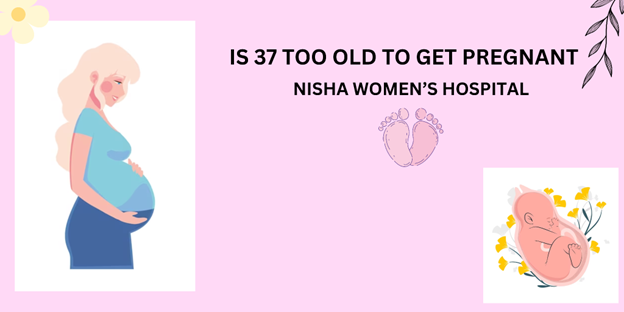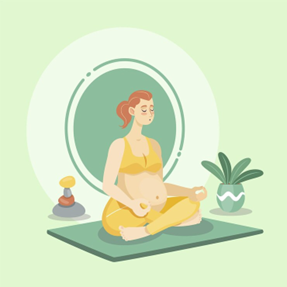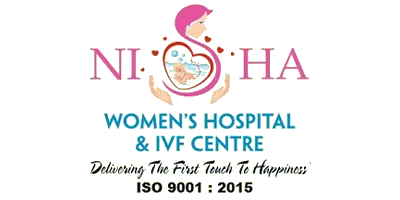The concern of pregnancy at 37 is becoming more relevant. It’s common for women to consider motherhood at a later age. At age 37, a woman’s fertility usually starts to decrease, making it a bit harder to get pregnant than when younger. But, many women still conceive and have healthy kids. At this age, stability in personal and work life is common. It could be very good for a parent. Remember, the risks and challenges are higher for pregnancies at a later age.

The complications may include gestational diabetes and hypertension. There may also be a need for more thorough prenatal care. Still, many women can have healthy pregnancies and deliveries at age 37. They need adequate medical care and supervision. In this case, the key is well-informed decisions. You must understand the specific details of pregnancy at that age.
At Nisha Women’s Hospital, we address the question: “Is 37 too old to get pregnant?” This guide clarifies the realities and challenges of conceiving at 37. It recognizes the growing trend of later pregnancies.
ABOUT HOSPITAL AND DOCTOR
Nisha Women’s Hospital, is a renowned healthcare institution specializing in obstetrics and gynecology. Under the skilled leadership of Dr. Himali Maniar Patel, an esteemed gynecologist in South Bopal, Ahmedabad, the hospital has become a beacon of excellence in women’s health care. .
Our experts provide key insights into fertility, risks, and tips. These insights empower women to make informed choices about their health. We focus on both medical and personal perspectives. We aim to support and guide women through the unique journey of becoming a mother at this stage in life.
IS 37 STILL A GOOD AGE TO GET PREGNANT?
At 37, pregnancy is still a viable option for many women. While fertility does decline with age, numerous women at this stage successfully conceive and have healthy pregnancies.
Dr. Himali Patel mentions that, “the likelihood of natural conception is influenced by factors such as overall health, lifestyle, and prior fertility history.”
Although there may be some increased risks, with proper health management and medical support, many women at 37 can expect a positive pregnancy experience.
Considering pregnancy at 37? Reach out now for expert advice on your journey to motherhood. Contact us now!
Trying to get Pregnant at 37? Read more to know about the chances of getting pregnant.
CHANCES OF GETTING PREGNANCY AT 37 NATURALLY
At 37, the chances of natural conception are slightly lower but still significant. The gradual decline in fertility is influenced by genetics, health, and reproductive history. Studies show a 29% chance of conceiving per cycle for women aged 35-39, close to the 33% in early 30s. Health choices and lifestyle greatly impact fertility.
PREGNANT AT 37 YEARS OLD – WHAT TO EXPECT?

Being pregnant at 37 years old comes with unique considerations and expectations. Here’s what to expect:
- Increased Monitoring: Expect more prenatal visits. They will track the health of both mother and baby. Pregnancies at this age are often considered higher risk.
- Higher Chance of Multiples: There’s an increased likelihood of conceiving twins or multiples, due in part to hormonal changes.
- More Comprehensive Techniques: Be ready for screenings like amniocentesis or advanced ultrasounds. They check for chromosomal abnormalities and other health problems.
- Higher risk Complications: Pregnancy has a higher risk of complications. These include gestational diabetes, high blood pressure, and preeclampsia.
- Longer Conception Time: It may take longer to conceive naturally compared to younger years, so patience and persistence are key.
- Emotional Well-being: Emotional support and stress management are crucial. This age brings confidence from life experience and anxiety about health risks.
- Healthy Lifestyle Emphasis: Maintaining a healthy lifestyle is crucial for the health of both mothers and fetuses. It means having a balanced diet and regular exercise.
- Possibility of Assisted Reproductive Technologies (ART): If natural conception is challenging, there may be a need to explore ART options like IVF.
Prepare for a healthier pregnancy at 37! Understand key aspects, manage expectations, and embark on your journey with confidence.
FERTILITY CHALLENGES AT 37
At 37, women may encounter several fertility challenges due to age-related changes. Here are key points to consider:

- Declining Egg Quality and Quantity: As women age, the quality and quantity of eggs naturally decrease, which can affect fertility.
- Increased Risk of Chromosomal Abnormalities:The risk of chromosomal abnormalities in eggs increases with age, potentially affecting conception and pregnancy outcomes.
- Longer Time to Conceive: Women at 37 may find that it takes longer to conceive compared to younger years.
- Higher Likelihood of Miscarriage: There is a slightly increased risk of miscarriage at this age due to factors like decreased egg quality.
- Possible Underlying Health Issues: Age may bring undiagnosed fertility issues to light, such as endometriosis or fibroids, which can impact fertility.
- Importance of Preconception Health Check: A thorough health assessment before trying to conceive can identify and address any potential issues.
- Consideration of Fertility Treatments: For those facing challenges, fertility treatments like IVF or IUI may be viable options.
- Role of Lifestyle Factors: Healthy lifestyle choices, such as a balanced diet, regular exercise, and avoiding smoking and excessive alcohol, can positively impact fertility.
Navigate your fertility options at 37 with expert gynecologists. Book your personalized consultation today!
HOW TO IMPROVE FERTILITY AT 37
To improve fertility at 37, consider these key strategies and tips to get pregnant:

- Healthy Lifestyle: Eat a balanced diet, exercise regularly, get adequate sleep and maintain a healthy weight.
- Regular Health Check-Ups: Identify and address any health issues that may affect fertility.
- Stress Management: Practice stress-reducing activities like yoga or meditation.
- Ovulation Tracking: Monitor your menstrual cycle to identify the most fertile days.
- Limit Alcohol and Avoid Smoking: Both can negatively impact fertility..
- Consider Fertility Treatments: Explore options like IVF or IUI with a healthcare provider if needed.
- Folic Acid Supplements: Take folic acid to support early fetal development.
Adopting these practices can enhance fertility for women at 37, though pregnancy at this age can be risky! Know more further.
PREGNANCY AT 37 – MAY COME WITH MORE RISKS
Pregnancy after the age of 37 is associated with a higher likelihood of certain risks, warranting closer monitoring and care:

- Gestational diabetes: Pregnant women have a higher chance of getting gestational diabetes. that happens during pregnancy. It usually goes away after childbirth.
- High Blood Pressure: It raises the risk of hypertension. Hypertension can lead to complications like preeclampsia.
- Chromosomal Abnormalities: The fetus is more likely to have them. They include Down syndrome. This change requires advanced genetic screening tests.
- Preterm Birth: A heightened risk of preterm labor and birth, which can result in additional health challenges for the baby.
- Low Birth Weight: Increased likelihood of the baby being born with low birth weight.
- Cesarean Delivery: A higher chance of requiring a cesarean section due to various age-related factors.
- Miscarriage and Stillbirth: Elevated risk of miscarriage and stillbirth compared to younger pregnant women.
- Recommended Regular Check-Ups: More frequent prenatal appointments to closely monitor the health of both mother and baby.
- Advanced Prenatal Screenings: Advisable to undergo comprehensive prenatal screenings like noninvasive prenatal testing (NIPT), amniocentesis, and detailed ultrasounds.
Ensure a healthy pregnancy after 37 with expert care from Nisha Women’s Hospital. Book an appointment now!
TAKEAWAYS (CONCLUSION)
In summary, pregnancy at 37 has unique challenges. But, it is still a hopeful and achievable journey. Nisha Women’s Hospital has the best gynecologists in South Bopal, Ahmedabad. It offers dedicated support and expert guidance for women at this important stage of life.
We specialize in natural conception and also manage higher health risks. We provide complete care. It ensures a safe and fulfilling pregnancy journey for every aspiring mother.
FAQs
- How common is it to give birth at 37?
It’s increasingly common, as more women choose to start families later in life.
- Does fertility decline at 37?
Yes, fertility starts to gradually decline in the early 30s and more after 35.
- At what age does a woman stop being able to get pregnant?
Women can conceive until menopause. Menopause happens between 45 and 55. But, fertility drops a lot after 35.
- Are there any special prenatal tests for women pregnant at 37?
Older mothers can undergo specialized tests. Examples include amniocentesis and chorionic villus sampling.
- How can I get pregnant fast at 37?
To get pregnant fast, keep healthy. Track ovulation. If needed, consult a fertility specialist.
- Is prenatal care different for women pregnant at 37?
Prenatal care might be more thorough. It includes frequent monitoring and tests. They aim to ensure the health of both mother and baby.
Reference Links:

